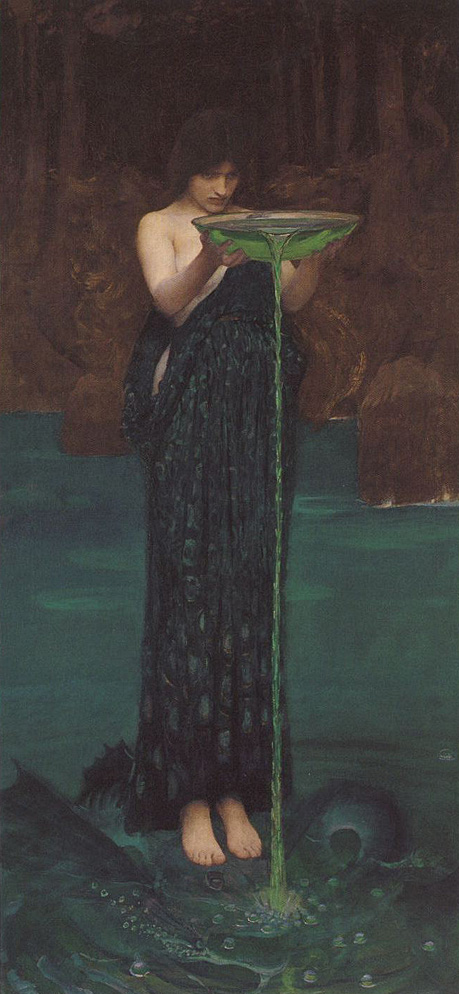On The Scented Trail of an Aromatic Cult of the Goddess Strenia to Usher in the New Year - Part I {Scented Thoughts} {Perfume List}

Circe Invidiosa by Waterhouse - Circe is the goddess of plants, drugs and charms
When researching new ways to celebrate the dawning of a New Year with scent besides wearing golden-haloed perfumes and ones making you think of Champagne, I happened on the antique existence of a goddess cult with fragrant associations of a different nature. Think "fresh", "brisk" and "invigorating" and deliciously lemony in today's perfume parlance...
It is said that once upon a time on New Year's day Romans would walk up to a sacred grove near the Coliseum located up on Via Sacra. This wood was dedicated to the Goddess Strenia, or Strena, or Strenua of Sabine origin. Her cult had been introduced by King Tatius. She was the goddess of force, strength, health, courage, but also pleasure. She moreover was the goddess of the New Year, purification and wellbeing. Verbena grew in her grove and it was considered sacred.
Strenia came to be associated with New Year' Day as she presided over words of encouragement and gifts of good scented omens in the form of branches of verbena some of which were then brought to the Capitol.The Brave in the beginnings were primarily honored but then the rest of the population became participants in the cult involving gift-exchange. People would visit each other on New Year's Day and say "Strenue", "have heart", and exchange gifts which have given today the word "Etrennes" in French to designate New Year's gifts.
"From almost the beginning of Mars' city the custom of New Year's gifts (strenae) prevailed on account of the precedent of king Tatius who was the first to reckon the holy branches (verbenae) of a fertile tree (arbor felix) in Strenia's grove as the auspicious signs of the new year."
(ab exortu paene urbis Martiae strenarum usus adolevit, auctoritate Tatii regis, qui verbenas felicis arboris ex luco Strenuae anni novi auspices primus accepit. ... Nomen indicio est viris strenuis haec convenire virtute.)
Is it a distant echo of that cult of force that William Faulkner remembered or guessed at when he wrote in his short story An Odor of Verbena making his heroine with masculine traits, Drusilla, say that, "verbena was the only scent you could smell above the smell of horses and courage and so it was the only one that was worth wearing"? Or was he simply alluding to the natural pungency and strong scent of the plant? Later in the story he writes about how one of the characters, Baynard, is "enclosed in the now fierce odor of the verbena sprig"
The meaning of exchanging verbena foliage was to try to diffuse into the new year the medicinal and aromatherapeutic properties known to the plant, which is acknowledged as a magic plant in many religious traditions as it is considered to be one of the most versatile medicinal plants.
After a while, new gifts came to be substituted and these were said to be dates, figs, and honey. A mention of dates covered with gold leaf is also found (money coins were also offered.)
The sweetness of these delicatessen were seen as a symbol of the softness and sweetness one wished would fill up the new year.
Stay tuned for part 2 of this scented-trail series which sees the evolution of a fragrant custom and how you can apply these historic elements as inspiration for fragrance-wearing today.









